 Exhibition Introduction Exhibition Introduction  |
|
Josef
Schulz, born in 1966, in Bischofsburg, Poland, is an exceptionally
creative and dynamic artist who has made a contribution in the German
contemporary photography lineage.
Josef Schulz incorporates personal emotions and sensitivity into
analog photography through the use of a highly technical medium of digital
editing process. His working method resembles the process of a painter
retouching a piece of work and as a result of this purification, the form of
the subjects remains and the details are faded away.
The diminishing of details, emphasis on color and delicately-constructed expression allows the viewer to experience going back and
forth between two worlds; a realistic world captured by photography and the
imaginary world created by a human-being. Josef Schulz throws the
question of the ¡®reality/truth¡¯ behind photography,
but also overcomes the limitations in photography and creates a unique creative
work of art.
These photographs are about
the artist¡¯s intuition to reduce the expectations we have and what there is in reality
and these acts in return creates an ideal world. We are familiar with
interpreting landscape, and when we see something unexpected, we realize there
is something different. This small difference gives us the feeling similar to
seeing a glimpse of a world created by a human-being. The dignity, magnificence
and majesty of the Swiss Alps, the splendor of nature, the expansion of space
and the opening out of vision is also about a bigger view of the world and a
beautiful depiction of ideal natural beauty.
|
| ¡ã top |
 About Artist About Artist  |
|
German Photographer Josef Schulz (1966 - )
Josef
Schulz is an exceptional artist who has made a contribution in the German
contemporary photography lineage. He was born in 1966, in Bischofsburg, Poland. In 1993 he enters Kunstakademie Düsseldorf where he
takes in the historic German photographic methods of the 1920s, of Bernd Becher. In 1999, in the same institute he learns from
Thomas Ruff, a
renowned figure in German photography. In 2000 he is awarded second prize of Kodak
und Large Format Ink jet Award, and third prize of artBahn-Wettbewerbes Award.
In 2001 he receives the European Architectural Photography Prize, Vision in
Architecture, and in 2002 he is awarded the Stiftung Kunst und Kultur des
Landes NRW.
In
2005 Josef Schulz is named as one of the ¡®reGeneration¡¯ photographers. This specific project was set up
by Musée de l¡¯Elysée, Lausanne where the selection of 50 photographers was nominated as those who will become
the most important figures in 2025. After being selected as one of the artists,
Josef Schulz makes a strong impression in ¡®reGeneration, 50
photographers of tomorrow¡¯ exhibition. Soon afterwards he is selected to
receive ¡®Voies off¡¯ prize in Rencontre internationale de la photographie, in Arles, a prize
given to the best promising artist.
Josef Schulz develops his own photographic world. He has
continuously held many exhibitions internationally, in Germany, France,
Switzerland, the Netherlands, Austria and all across Europe, and also in the United States. His works are in collection in Zentrum für Kunst und Medientechnologie
Karlsruhe and Aarhus Art Museum. Josef Schulz¡¯s works are also in Art
Collection Deutsche Börse.
Josef Schulz¡¯s solo exhibition ¡®Real & Unreal¡¯ was held in Gallery Lumière (2005. 12. 20 - 2006. 2. 5).
His works were also shown in a group exhibition ¡®Passion for Art, Mission for Money – contemporary collection¡¯ by Gallery Lumière (2007. 9. 20 – 2007. 11. 4).
In this group exhibition, a selection of his ¡®Sachliches¡¯ and ¡®Form¡¯ series was
shown together with the first work from
the ¡®Terraform¡¯ series. Gallery Lumière proud to present Josef Schulz¡¯s landscape works of the ¡®Terraform¡¯ Series,
in Josef Schulz¡¯s solo exhibition ¡°Glory of Nature¡± (2009. 12. 11 – 2010. 2. 12).
|
| ¡ã top |
 About Exhibition About Exhibition  |
|
"Glory of Nature " – Terraform Series
Through the use of a highly technical medium of digital editing
process, the artist hides the characteristics in reality from the viewer. Josef Schulz is interested in this momentary confusion, the moment when
the line between authenticity and construction becomes blurred, when it is no
longer obvious which detail in the photograph is genuine and which one has been
added digitally, in order to create the artist¡¯s subjective ideal. In this
manner Schulz gives his answer to the question about the existence of
objectivity in a photographed image.
According to Josef Schulz ¡°Photography isn¡¯t just the moment of taking photos.¡± For Josef Schulz, the
pressing of the shutter is not the last. He takes photographs in an analogue
method, and then with digital technology he makes the subjects in his work to
be more structural and abstract. This method itself is an artistic ¡®act¡¯ and it
is only after going through this process that he believes his work can be
regarded as a perfect piece of art work. In the artist¡¯s photographic works,
nothing of the documentary and informative role can be seen. In contrast he
throws the question of the ¡®reality/truth¡¯ behind photography and he stresses
the importance of the use of digital processing. The real images become unreal
as it is passed through digital process. For the artist, this process is also a
solution to how he can include his creativity, sentiments and philosophy. Josef Schulz questions the ¡®reality¡¯ in photographs and the
method he uses in completing his works are the steps he takes to narrow the gap
between the ¡®photographic¡¯ and the ¡®painted¡¯.
This ¡°Terraform¡±
exhibition of Josef Schulz¡¯s works portrays ideological images of ¡®pure¡¯
landscape. The accompanying photographs were taken at a variety of locations in
the Alps. They show summits, rocks, lakes and
valleys, areas of countryside devoid of people, irritatingly beautiful and of
singularly ideal appearance. In order to show the most beautiful image of
nature Josef Schulz uses a combination of photography and digital editing process,
and through these medium he produces astonishing results. Through the extreme
reduction of image details and content-related references, but also by
emphasizing individual colors and contrasts, Josef Schulz provokes a
heightening, a dramatization of the settings in a way normally only found in
paintings. Space is even more expanded and the viewer can be immersed in the
particular contemporary art work with a wider perspective. In this series of
works the viewer experiences a fascinating sounding out of the border between the
photographic 'truth' and created ¡®reality¡¯. Furthermore, this particular technical
approach the artist takes results in displaying the artist¡¯s subjective ideas
on nature.
|
| ¡ã top |
 Artist Biography Artist Biography  |
EXHIBITIONS
| 2011 |
Sign Out, Fiebach & Minniger Galerie, Köln
|
| 2010 |
Berg och Gränser, Fotografins Hus, Stockholm
|
| 2010 |
ÜBERBLICK, Kunstverein Emsdetten
|
| 2010 |
sign out, Galerie Weigand, Ettingen/Karlsruhe
|
| 2009 |
übergang, Galerie Wanger + Partner, Berlin
|
| 2009 |
übergang, Dollinger Art Project, Tel Aviv, Israel
|
| 2009 |
übergang, Kunsthaus Essen
|
| 2008 |
Forms,
Yossi Milo Gallery, New York, USA "La Dernier Seance", Musee Maillol, Paris
|
| 2008 |
Sachliches, Goethe Institut, Riga, Lettland
|
| 2008 |
Formenlehre, Kunstverein, Ludwigsburg
|
| 2008 |
Terraform, Galerie Heniz-Martin Weigan, Ettlingen
|
| 2008 |
übergang 2,
ZF-Kulturstiftung, Zeppelin Museum Friedrichsfafen
|
| 2007 |
Crossings,
Galleria Manuela Klerkx, Mailand, Italien
|
| 2007 |
Simulacrum,
Kunstverein Göppingen
|
| 2007 |
übergang,
Fiebach & Minninger Galerie, Köln
|
| 2007 |
Focus
Contemporary Photography Gallery, Cape Town, Südafrika
|
| 2006 |
übergang, Galerie Heinz-Martin Weigand, Ettlingen/Karlsruhe
|
| 2006 |
Real and Unreal Gallery Lumière
Seoul
|
| 2005 |
Subareale,
Kunstverein Ingolstadt, Ingolstadt
|
| 2005 |
Neue Arbeiten, Fiebach &
Minninger Galerie, Cologne
|
| 2005 |
Hallen, MuWa, Museum für Wahrnehmung, Graz
|
| 2004 |
Shape and Space, Galerie Haus Schneider, Ettlingen/Karlsruhe
|
| 2004 |
Mostra #1, Studio Manuela Klerkx, Milan
|
|
2003
|
Formen,
Galerie Haus Schneider, Ettlingen/Karlsruhe
|
|
2003
|
Wald und Wiese, Fiebach & Minninger Galerie, Cologne
|
|
2002
|
Acker 204, Düsseldorf
|
|
2001
|
Galerie
Januar e.V., Bochum
|
|
2001
|
Centre Commercial, Fiebach & Minninger Galerie, Cologne
|
|
2001
|
Gist Galerie, Brummen
|
|
2001
|
sachliches, Galerie Haus Schneider, Ettlingen/Karlsruhe
|
|
2000
|
josef.schulz@syrius, Syrius, Düsseldorf
|
|
| ¡ã top |
 Exhibition Works Exhibition Works  |
|
* Please make sure that all images indicate
copyright.
The proper form would be ¨Ï Josef Schulz
|
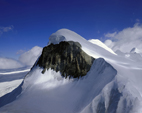
©Josef
Schulz
Berg
gipfel #1, Mountain Summit #1
2008, C-Print, Diasec
|
|
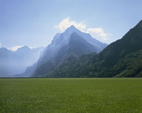
©Josef
Schulz
Tal #2, Valley #2
2008, C-Print, Diasec
|
|
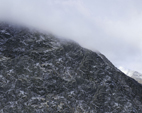
©Josef
Schulz
Felswand
#2, Rock Face #2
2008, C-Print, Diasec
|
|
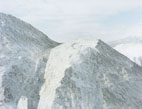
©Josef
Schulz
Berg
weiss, White Mountain
2008, C-Print, Diasec
|
|
| ¡ã top |
 Visiting Information Visiting Information  |
|
 Location Location
|
Gallery Lumiere Seoul
1-116 Shinmoonro 2 Ga, Chongro-Gu, Seoul Korea
(110-062)
Tel : 02-517-2134 / 2176
Fax : 02-517-2146 |
 Gallery
Hours Gallery
Hours
|
Monday - Saturday 10:00 am -
6:00 pm
Closed on Sundays
|
 Admission Admission
|
Adult:
Student:
Group:
|
5,000 won
4,000 won
4,000 won
|
|
 Appointment Appointment
|
For consultation on exhibited
works and other photographic collections meetings
can be arranged through appointment only.
|
 Gallery
Talk Gallery
Talk
|
Monday - Saturday (in Korean)
Saturday (in English)
|
12:30pm, 4:30pm
3:30pm
|
|
 Way
to Gallery Lumiere Seoul Way
to Gallery Lumiere Seoul
Directions by Subway
Line 5 Kwanghwamun station, exit No.7.
Go straight towards the location of the Seoul
History Museum, and at the Salvation Army building
(Kusaekun) turn right and immediately left
again. Walk up the back street for about 150m;
you will see the Embassy of the Czech Republic
on your left and Gallery Lumiere Seoul on the
right.
Directions by
Bus
Bus No. 260, 271, 370, 470, 471, 601, 602,
721, 9602
Get off at Kwanghwamun bus station (Saemunan
Church).
Walk up the street between the Salvation Army
building (Kusaekun) and the Seoul History Museum,
then immediately turn left again. Walk up the
back street for about 150m; you will see the
Embassy of the Czech Republic on your left
and Gallery Lumiere Seoul on the right.
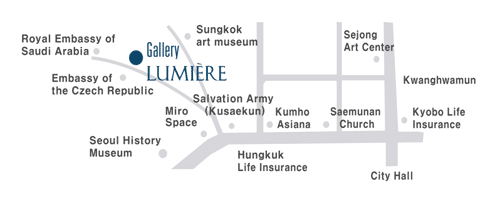 |
|
|
| ¡ã top |
|

